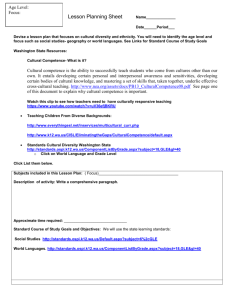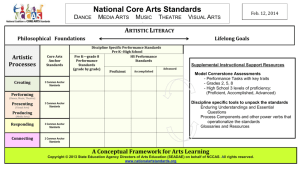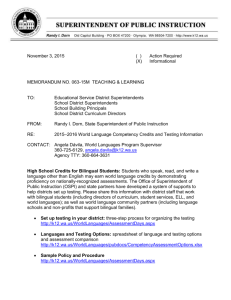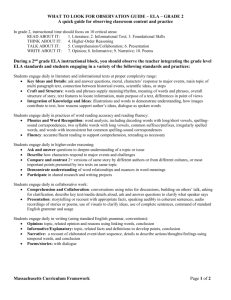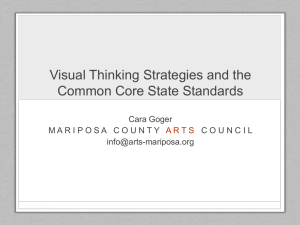CCSS World Language Standards Handout
advertisement
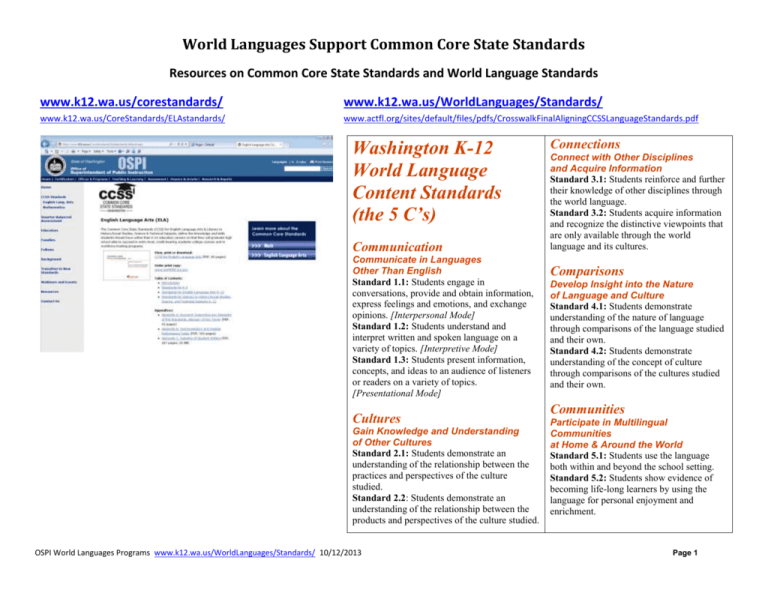
World Languages Support Common Core State Standards Resources on Common Core State Standards and World Language Standards www.k12.wa.us/corestandards/ www.k12.wa.us/WorldLanguages/Standards/ www.k12.wa.us/CoreStandards/ELAstandards/ www.actfl.org/sites/default/files/pdfs/CrosswalkFinalAligningCCSSLanguageStandards.pdf Washington K-12 World Language Content Standards (the 5 C’s) Communication Communicate in Languages Other Than English Standard 1.1: Students engage in conversations, provide and obtain information, express feelings and emotions, and exchange opinions. [Interpersonal Mode] Standard 1.2: Students understand and interpret written and spoken language on a variety of topics. [Interpretive Mode] Standard 1.3: Students present information, concepts, and ideas to an audience of listeners or readers on a variety of topics. [Presentational Mode] Cultures Gain Knowledge and Understanding of Other Cultures Standard 2.1: Students demonstrate an understanding of the relationship between the practices and perspectives of the culture studied. Standard 2.2: Students demonstrate an understanding of the relationship between the products and perspectives of the culture studied. OSPI World Languages Programs www.k12.wa.us/WorldLanguages/Standards/ 10/12/2013 Connections Connect with Other Disciplines and Acquire Information Standard 3.1: Students reinforce and further their knowledge of other disciplines through the world language. Standard 3.2: Students acquire information and recognize the distinctive viewpoints that are only available through the world language and its cultures. Comparisons Develop Insight into the Nature of Language and Culture Standard 4.1: Students demonstrate understanding of the nature of language through comparisons of the language studied and their own. Standard 4.2: Students demonstrate understanding of the concept of culture through comparisons of the cultures studied and their own. Communities Participate in Multilingual Communities at Home & Around the World Standard 5.1: Students use the language both within and beyond the school setting. Standard 5.2: Students show evidence of becoming life-long learners by using the language for personal enjoyment and enrichment. Page 1 World Languages Support Common Core State Standards Activity: Jot down points of alignment between the ELA CC Anchor Standards and World Language Standards (5 Cs). English Language Arts (ELA) Common Core Standards » Anchor Standards » College and Career Readiness Anchor Standards for READING Key Ideas and Details 1. Read closely to determine what the text says explicitly and to make logical inferences from it; cite specific textual evidence when writing or speaking to support conclusions drawn from the text. 2. Determine central ideas or themes of a text and analyze their development; summarize the key supporting details and ideas. 3. Analyze how and why individuals, events, and ideas develop and interact over the course of a text. Craft and Structure 4. Interpret words and phrases as they are used in a text, including determining technical, connotative, and figurative meanings, and analyze how specific word choices shape meaning or tone. 5. Analyze the structure of texts, including how specific sentences, paragraphs, and larger portions of the text (e.g., a section, chapter, scene, or stanza) relate to each other and the whole. 6. Assess how point of view or purpose shapes the content and style of a text. World Language Standards Communication: 1.2 Interpretive Mode Connections: 3.2 Distinctive viewpoints Integration of Knowledge and Ideas 7. Integrate and evaluate content presented in diverse media and formats, including visually and quantitatively, as well as in words. 8. Delineate and evaluate the argument and specific claims in a text, including the validity of the reasoning as well as the relevance and sufficiency of the evidence. 9. Analyze how two or more texts address similar themes or topics in order to build knowledge or to compare the approaches the authors take. Range of Reading and Level of Text Complexity 10. Read and comprehend complex literary and informational texts independently and proficiently. OSPI World Languages Programs www.k12.wa.us/WorldLanguages/Standards/ 10/12/2013 Page 2 World Languages Support Common Core State Standards Activity: Jot down points of alignment between the ELA CC Anchor Standards and Standards for Language Learning (5 Cs). English Language Arts (ELA) Common Core Standards » Anchor Standards » College and Career Readiness Anchor Standards for WRITING Text Types and Purposes 1. Write arguments to support claims in an analysis of substantive topics or texts, using valid reasoning and relevant and sufficient evidence. 2. Write informative/explanatory texts to examine and convey complex ideas and information clearly and accurately through the effective selection, organization, and analysis of content. 3. Write narratives to develop real or imagined experiences or events using effective technique, well-chosen details, and well-structured event sequences. Production and Distribution of Writing 4. Produce clear and coherent writing in which the development, organization, and style are appropriate to task, purpose, and audience. 5. Develop and strengthen writing as needed by planning, revising, editing, rewriting, or trying a new approach. 6. Use technology, including the Internet, to produce and publish writing and to interact and collaborate with others. World Language Standards Communication: 1.3 Presentational Mode Communities: 5.1 Language beyond school Research to Build and Present Knowledge 7. Conduct short as well as more sustained research projects based on focused questions, demonstrating understanding of the subject under investigation. 8. Gather relevant information from multiple print and digital sources, assess the credibility and accuracy of each source, and integrate the information while avoiding plagiarism. 9. Draw evidence from literary or informational texts to support analysis, reflection, and research. Range of Writing 10. Write routinely over extended time frames (time for research, reflection, and revision) and shorter time frames (a single sitting or a day or two) for a range of tasks, purposes, and audiences. OSPI World Languages Programs www.k12.wa.us/WorldLanguages/Standards/ 10/12/2013 Page 3 World Languages Support Common Core State Standards Activity: Jot down points of alignment between the ELA CC Anchor Standards and Standards for Language Learning (5 Cs). English Language Arts (ELA) Common Core Standards » Anchor Standards » College and Career Readiness Anchor Standards for SPEAKING & LISTENING Comprehension and Collaboration 1. Prepare for and participate effectively in a range of conversations and collaborations with diverse partners, building on others’ ideas and expressing their own clearly and persuasively. 2. Integrate and evaluate information presented in diverse media and formats, including visually, quantitatively, and orally. 3. Evaluate a speaker’s point of view, reasoning, and use of evidence and rhetoric. World Language Standards Communication: 1.1 Interpersonal Mode Presentation of Knowledge and Ideas 4. Present information, findings, and supporting evidence such that listeners can follow the line of reasoning and the organization, development, and style are appropriate to task, purpose, and audience. 5. Make strategic use of digital media and visual displays of data to express information and enhance understanding of presentations. 6. Adapt speech to a variety of contexts and communicative tasks, demonstrating command of formal English when indicated or appropriate. OSPI World Languages Programs www.k12.wa.us/WorldLanguages/Standards/ 10/12/2013 Page 4

